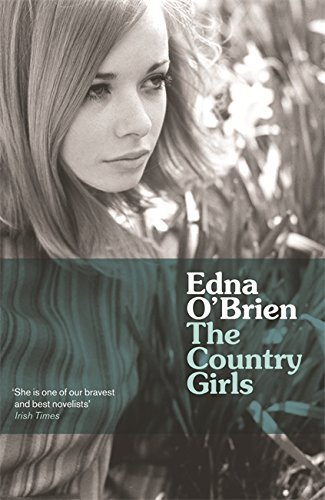It's exciting reading such an influential book for the first time, but it's also a curious experience since radical elements of the story can already feel familiar. I've read a good amount of recent Irish fiction. So a novel about an Irish girl coming of age, experiencing the oppressive forces of the patriarchy/conservative religion, moving from the country to an independent life in the city and engaging in a romantic relationship with an older man doesn't feel that revolutionary now. But, at the time of its initial publication in 1960, the story presented in “The Country Girls” stirred a lot of controversy as it was condemned by some politicians and religious leaders who even went to the extreme of burning copies of the book.
I can only admire how Edna O'Brien broke boundaries at the time to represent young female experience in her protagonist of Caithleen “Cait” Brady. It's arrestingly portrayed how she must live with a father prone to violent alcohol-fuelled outbursts and amongst a community of men who expect kisses (or more) in exchange for favours. Though her academic prowess earns her a promising scholarship to a convent school she discovers she must contend with mean-spirited nuns and stomach-turning meals (stringy meat and sodden cabbage). Caithleen also develops a romantic infatuation with a figure nicknamed Mr. Gentleman who is married and grooms her for a future affair from the age of fourteen. Together with her longtime friend (frenemy) Bridget “Baba” she moves to Dublin to live for the first time as independent young women. These experiences are vividly conveyed throughly sharply-rendered details and emotional descriptions. So, even if such a storyline may no longer feel entirely new, it remains an utterly captivating tale that's brilliantly written.
Part of the magic of this book is in the minutiae of Caithleen's recollections whether it's glimpsing a woman in a striking sequin dress, carrying a cherished tea service or kindly receiving an iced bun when she's experiencing despair/grief. These are the kinds of small things which resonate with deep personal meaning and serve as important memories so that in turn they also feel special to the reader. Something such as a layer of dust on a cup of milk can feel so real it's like I've experienced it myself. The characterisation is equally as vivid in how even characters who are vile come across as complex and like someone we're likely to encounter on the street. I found it informative the way O'Brien describes the hierarchy amongst the nuns at the school based on their relative education and family status so even these predominantly overbearing figures came across as well rounded. Though Baba is snobbish and acts cruelly towards Caithleen their friendship feels real and layered. Both girls have distinct personalities with positive and negative traits. Baba's relationship with her parents hints at her motivations and why she might act so mean. Most poignantly, like all long standing friendships, their companionship runs hot and cold over the course of many years.
It's also completely understandable why Caithleen would be so enamoured with Mr. Gentleman who seems to be going through something of a mid-life crisis, but their secret affair is very ominous since it's unlikely this pairing will end in happiness. I found myself simultaneously swept up in Caithleen's young romance and extremely nervous about where their passion might lead. The way in which a tenderness builds between them and the awkwardness of other dates Caithleen goes on is so involving that I raced through reading this story. It's a testament to her power as a writer that O'Brien can make characters and subject matter that now feel well-tread feel entirely new and gripping. The only other novel I've read by her is the relatively recent “The Little Red Chairs” and the fact that O'Brien continues to break new ground by writing about politically-contentious subject matter is so impressive. I'm now eager to read the next two books in 'The Country Girls Trilogy' as well as her other work.








